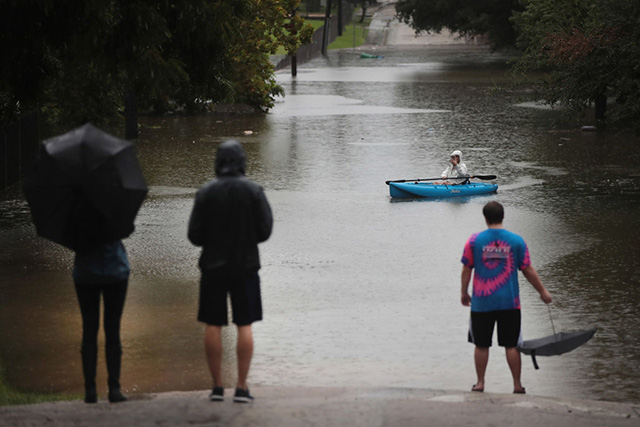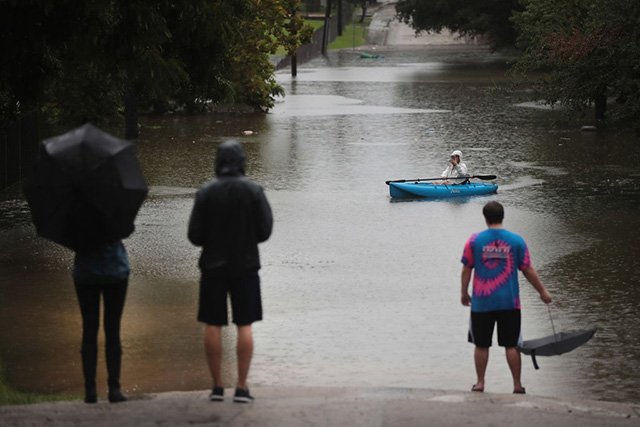
 Residents navigate a flooded street that has been inundated with water from Hurricane Harvey on August 27, 2017, in Houston, Texas. Harvey, which made landfall north of Corpus Christi late Friday evening, is expected to dump upwards of 40 inches of rain in areas of Texas over the next couple of days. (Photo: Scott Olson / Getty Images)
Residents navigate a flooded street that has been inundated with water from Hurricane Harvey on August 27, 2017, in Houston, Texas. Harvey, which made landfall north of Corpus Christi late Friday evening, is expected to dump upwards of 40 inches of rain in areas of Texas over the next couple of days. (Photo: Scott Olson / Getty Images)
My mother and father live just north of Houston. Here is the rather cryptic text message my mother, sent me late Sunday night:
Lost power. Got generator running, fridge on, light, running small AC in morning. Tired. Staying upstairs to escape generator noise.
Trees down. Wind up. Waiting for daylight to use chainsaws. Front entrance flooded.
We are okay. Tired.
Love you,
Mom
Tropical Storm Harvey, which made landfall near Corpus Christi last Friday as a Category 4 hurricane, has stalled over south-central Texas and has been dumping record levels of rain on this population-dense area. The area flooded in Texas, as of Sunday, was, staggeringly, the size of Lake Michigan. At the time of this writing, 450,000 Texans were expected to seek disaster aid.
To see more stories like this, visit “Planet or Profit?”
Meteorologist Eric Holthaus tweeted last week, “Since the 1950s, Houston has seen a 167% increase in heavy downpours. #Harvey could bring the worst one yet.”
Unfortunately for the people of south Texas, Holthaus was spot on. More than 30 inches of rain have fallen, with an additional 15-25 inches expected in the coming days.
At least five people have died from the storm, and that number is expected to rise. More than 150 major roads in Houston alone are now rivers.
Houston is the fourth largest city in the US, with 6.8 million people in its metro area, and is the petrochemical and refinery hub of the country. It is anyone’s guess how long it will take the city to rebuild and recover.
What made Harvey so brutal? Scientific studies have shown for quite some time that Anthropogenic Climate Disruption (ACD) amplifies the impacts of hurricanes by causing them to have larger storm surges, higher wind speeds and greater rainfall amounts. All of these are driven by the amount of heat in the oceans.
According to a study by Ars Technica, this past winter, for the first time on record, water temperatures in the Gulf of Mexico never fell below 73°F. These conditions set the stage for what we are witnessing now: Warming waters intensify the strength and impacts of tropical storms and hurricanes, as previous studies have shown. Additionally, the water temperatures in the Gulf of Mexico this summer have been exceedingly warm, creating the prime conditions for a storm like Harvey. ACD is amping up hurricanes.
Now, Harvey will be another name added to the list of other deadly ACD-amplified hurricanes, like Katrina, Ike and Sandy, which have caused record-setting levels of devastation in the US.
“Fuel for the Storm”
In more ways than one, Harvey has been unprecedented, and that is due to ACD’s impacts on the conditions for the storm.
Sea-surface temperatures near Texas were between 2.7° and 7.2°F above average, making them some of the warmest ocean temperatures on Earth. This caused Harvey to ramp up from a tropical depression to a catastrophic Category 4 hurricane in merely two days’ time.
“This is the main fuel for the storm,” Kevin Trenberth, a senior scientist at the US National Center for Atmospheric Research told The Atlantic. “Although these storms occur naturally, the storm is apt to be more intense, maybe a bit bigger, longer-lasting, and with much heavier rainfalls [because of that ocean heat].”
Trenberth also told The Atlantic, “The human contribution can be up to 30 percent or so of the total rainfall coming out of the storm. It may have been a strong storm, and it may have caused a lot of problems anyway — but [human-caused climate change] amplifies the damage considerably.”
Trenberth is the author of a 2011 study titled, “Changes in precipitation with climate change,” which shows how the water-holding capacity of air increases 7 percent for every 1°C warming, which naturally leads to an increase in the atmosphere’s ability to hold water, and sets the conditions for epic rain events like Texas is experiencing today.
“Epic and Catastrophic Flooding”
Late Sunday the National Weather Service announced “epic and catastrophic flooding” had occurred in and around Houston and Galveston, and that the flooding could worsen with additional expected rainfall.
In 2001, Tropical Storm Allison was the worst rainstorm to strike a city in the US in modern history. It caused a deluge in Houston, which left 30,000 homeless, killed 23 in Texas as a whole, and caused severe damage to hospitals and other buildings in downtown Houston.
Harvey may well exceed these records, if rainfall continues as predicted.
Scientists are already warning that the storm is going to cause the most devastating flooding the city has ever seen.
“The economic impact should be greater than any other flood event we’ve ever experienced,” Sam Brody, a scientist at Texas A&M University in Galveston who specializes in natural hazards mitigation, told the Texas Tribune. “And it’s going to take years for these residential communities to recover.”
Harvey is unique in another way as well. According to Stephanie Zick, who is studying tropical cyclones at Virginia Tech University, Harvey is the only storm on record in the Gulf of Mexico to have ever intensified in the 12 hours prior to making landfall.
Given that warming of both the atmosphere and oceans is only going to continue to escalate, a text I received Sunday from a good friend of mine who lives near downtown Houston captured what Harvey portends:
It will take years to recover.
We are all rescuing each other.
Odd to think that our future can be summed up like that.
Join us in defending the truth before it’s too late
The future of independent journalism is uncertain, and the consequences of losing it are too grave to ignore. We have hours left to raise the $12,0000 still needed to ensure Truthout remains safe, strong, and free. Every dollar raised goes directly toward the costs of producing news you can trust.
Please give what you can — because by supporting us with a tax-deductible donation, you’re not just preserving a source of news, you’re helping to safeguard what’s left of our democracy.